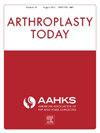A Handheld, Portable Image-Based System May Outperform Computer Navigation or Robotic Platforms in Providing Accurate Acetabular Component Positioning
IF 1.5
Q3 ORTHOPEDICS
引用次数: 0
Abstract
Background
Malposition of the acetabular component during total hip arthroplasty (THA) is a leading cause of complications and need for revision. Robotic-assisted THA purports to improve accuracy of component positioning with many reports demonstrating over 92% of components within 10° of inclination and anteversion compared to intraoperative system output. This study aimed to evaluate the intraoperative accuracy output of acetabular cup position values using a handheld miniaturized portable navigation system (Naviswiss, AG) compared to postoperative computed tomography (CT) scans.
Methods
A total of 108 direct anterior approach THA surgeries using the intraoperative navigation device were performed over a 6-month period. Intraoperative device output for measured acetabular component inclination and anteversion were recorded and compared with values derived from postoperative CT scans.
Results
Postoperative CT analysis of acetabular component positioning demonstrated 97.22% and 94.44% were within 5° of intraoperative inclination and anteversion, respectively, compared to intraoperative values from the navigation unit. No CT demonstrated an absolute inclination or anteversion measurement difference more than 8° from the intraoperative navigation unit value. Overall, 92.59% of components were within 5° and 100% were within 8° for both inclination and anteversion compared to postoperative CT measurements.
Conclusions
This handheld portable navigation system yielded highly accurate intraoperative component positioning values confirmed by postoperative CT scans during direct anterior THA, possibly superior to reported robotic-assisted THA values. These smaller, portable, and more accessible intraoperative units may provide surgeons improved accuracy and availability in a number of surgical settings for use in THA.
基于图像的手持便携式系统在提供准确的髋臼组件定位方面可能优于计算机导航或机器人平台
背景在全髋关节置换术(THA)中,髋臼组件定位错误是导致并发症和翻修需求的主要原因。机器人辅助全髋关节置换术(Robotic-assisted THA)可提高组件定位的准确性,许多报告显示,与术中系统输出相比,92%以上的组件倾斜度和前倾角在10°以内。本研究旨在评估使用手持式微型便携导航系统(Naviswiss,AG)与术后计算机断层扫描(CT)相比,术中输出的髋臼杯位置值的准确性。方法在6个月的时间内,共进行了108例使用术中导航设备的直接前路THA手术。结果术后CT对髋臼组件定位的分析表明,与导航装置的术中值相比,97.22%和94.44%的髋臼组件的术中倾斜度和前倾角分别在5°以内。CT 显示的绝对倾斜度或前倾角与术中导航仪测量值的差异均未超过 8°。总体而言,与术后 CT 测量值相比,92.59% 的组件倾斜度和前倾角都在 5° 以内,100% 的组件倾斜度和前倾角都在 8° 以内。结论在直接前路 THA 手术中,这种手持便携式导航系统获得了经术后 CT 扫描确认的高度准确的术中组件定位值,可能优于已报道的机器人辅助 THA 值。这些更小、更便携、更易获得的术中设备可为外科医生提供更高的准确性,并可在多种手术环境中用于 THA。
本文章由计算机程序翻译,如有差异,请以英文原文为准。
求助全文
约1分钟内获得全文
求助全文
来源期刊

Arthroplasty Today
Medicine-Surgery
CiteScore
2.90
自引率
0.00%
发文量
258
审稿时长
40 weeks
期刊介绍:
Arthroplasty Today is a companion journal to the Journal of Arthroplasty. The journal Arthroplasty Today brings together the clinical and scientific foundations for joint replacement of the hip and knee in an open-access, online format. Arthroplasty Today solicits manuscripts of the highest quality from all areas of scientific endeavor that relate to joint replacement or the treatment of its complications, including those dealing with patient outcomes, economic and policy issues, prosthetic design, biomechanics, biomaterials, and biologic response to arthroplasty. The journal focuses on case reports. It is the purpose of Arthroplasty Today to present material to practicing orthopaedic surgeons that will keep them abreast of developments in the field, prove useful in the care of patients, and aid in understanding the scientific foundation of this subspecialty area of joint replacement. The international members of the Editorial Board provide a worldwide perspective for the journal''s area of interest. Their participation ensures that each issue of Arthroplasty Today provides the reader with timely, peer-reviewed articles of the highest quality.
 求助内容:
求助内容: 应助结果提醒方式:
应助结果提醒方式:


